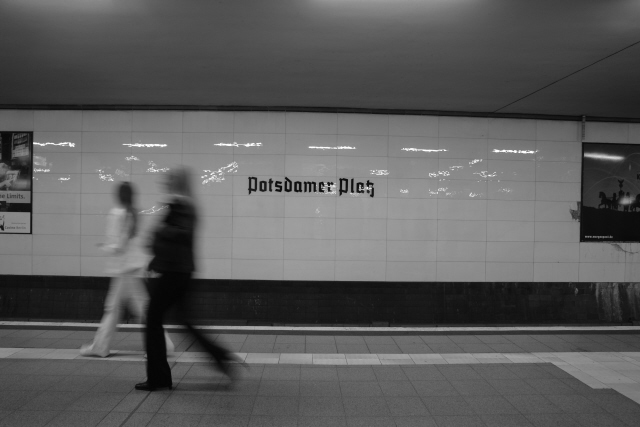On Potsdamer Straße (to see an old friend)
/By Paul Scraton:
Potsdamer Straße talks to me, as I walk down from the S-Bahn, past the library and across the canal. It talks to me about the Joseph-Roth-Diele, with its checkered tablecloths and a menu of goulash and spätzle, surrounded by the books and the words of a writer who was both of Berlin and not from Berlin, a man who disliked the city intently and yet became one of its greatest chroniclers. It talks to me about the shop for believers, filled with statues and trinkets; a little piece of Rome in this godless city. And it speaks to me of the Wintergarten and its cabaret stage, and the many thousands of performances I’ve never seen.
Not all the memories of the Potsdamer Straße are mine, but some are, and they take me back to my earliest days in the city. A long night with friends who lived on a side street to this great thoroughfare, starting with cocktails in a dark bar of concrete and polished wood, and ending in an all-night drinking den with carpet on the walls and friendly drag queens, with one more beer to toast the rising sun. Another friend lived down the street, from whose apartment we could watch Christopher Street Day parades while eating a huge watermelon bought from the supermarket on the corner along with Fladenbrot and dips. And Potsdamer Straße reminds me of the night bus home to Steglitz, catching glimpses of 21st century versions of Sally Bowles through the window, visions wrapped in long coats and heavy scarves beneath the street lights. How I was too lonely and scared to press the button, to bring the bus to a halt and climb down onto the pavement.
***
Anyone who moves to this city at any time is told that they came too late. They should have been here in the 1990s. Or the 1970s. Or the 1920s. But in those first few months, the Potsdamer Straße I spied through the night bus window offered a glimpse of the different versions of the city I arrived too late to experience. There was Franz Hessel, passing Christopher Isherwood on the street corner outside a red-lit bar. Across the road, a pale boy in the shadows who has come to the city to meet David Bowie. And my friends on the side street, newly arrived from the south, moving in to the apartment as the shadow of the Berlin Wall still lingered up the road, just a mile or so to the north.
A decade later it was my turn. A train from Schönefeld with the city under snow. The television tower, lost in the mist. Darkness in the streets around Alexanderplatz, which made the three letters – OST – above the Volksbühne seem to shine all the brighter. The earliest memories of a place, seared the strongest.
On Potsdamer Straße I walk to see an old friend accompanied by these memories. Fragments and faces. Bodies and beer bottles. Up to now, my friend has haunted other places in the city. A basement bar in Mitte. An art school garden in Charlottenburg. A soft summer evening in Wedding. After today, he will join the cast that stalk Potsdamer Straße with me.
***
None of us experience a place in the same way. We all bring with us our own stories and knowledge, our own cast of characters, whether real or imagined. Even in unknown or unfamiliar places we rarely arrive empty handed, and what we see when we get there is shaped by what we know and what we don’t. A few weeks ago, in my friend’s kitchen, he talked about his work in the same way that I think about the Potsdamer Straße. He could show me something, he said, but he couldn’t tell me what to feel. Everyone brings their own luggage. Everyone brings their own ghosts.
***
On Potsdamer Straße, where Joseph Roth loiters, making space on the pavement for pious shoppers, and the street looks the same now as it did when I viewed it through a rain- and exhaust-smudged window (even though I know that it can’t), I turn into a courtyard to meet my old friend. People used to make newspapers here. Journalists, editors, printworkers. You can see it in the buildings, read it in the brick and glass and concrete. A form for a purpose, now used for something else, like so many places in this city. I think of all those words, written and printed and sent out from the gates. News today. Chip paper tomorrow. Add this place to the memories; my own and of others. Add it to what I hear when Potsdamer Straße talks to me. And add it to what I will be holding within as I face my old friend’s creations.
***
Paul Scraton is the editor in chief of Elsewhere: A Journal of Place and the author of two books published by Influx Press: Ghosts on the Shore: Travels along Germany’s Baltic coast (2017) and Built on Sand (2019), a novel set in Berlin and Brandenburg.


